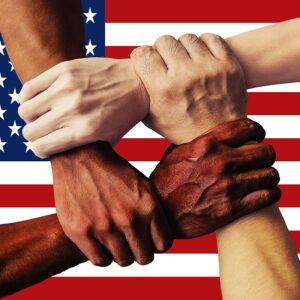Americans can resolve our current bout of divisiveness by recognizing that every American has the same Bill of Rights.
That may sound trite or pollyannaish, but acknowledging our shared standing as Americans is fundamental. In fact, it’s hard to imagine treating one another as equals otherwise. This point is particularly crucial for people of faith who enter the public square, through politics, protests, social media or some other avenue.
“Consider first whether you are entering that space as a citizen or as one who believes they hold a privileged position,” said Darrell Bock, the executive director of cultural engagement and senior research professor of New Testament studies at Dallas Theological Seminary.
The distinction is important. Entering the public arena as a citizen puts us on the same footing. When we treat others as equals, we can sharply disagree even on matters of theology and still respect each other and appreciate democratic norms.
This approach “will lead to a recognition that we share public space in a country,” Bock observed. “And that can shift to a discussion of the common good.”
When you flip this around, it becomes harder to discuss the common good. If we enter the public square with the idea that our religious or philosophical views provide a privileged position, we may be tempted to try to dominate the other. An assumption of privilege can produce intolerance and, at worst, violent extremism.
“You try to make the world into a place it isn’t and won’t be,” Bock said.
Indeed, America’s founding president, George Washington, wrote to various faith communities across the new nation, making the case that religious freedom was both a right and duty of citizenship. Part of being an American is respecting people of different religions.
To be sure, though, those who adhere to one of the three major Abrahamic faiths — Judaism, Islam and Christianity — face theological differences that can easily lead to sharp division.
Muhammad’s story differs from that of Jesus. The concept of redemption may vary from faith to faith. And sacred texts may require practices that seem alien to those who don’t follow them. These distinctions are about ultimate beliefs, so we naturally can feel slighted or insulted when discussing our deepest beliefs with others from different traditions.
Pastor Bob Roberts, senior global pastor of Northwood Bible Church in Keller, Texas, lives with this reality daily. The Baptist minister is president of the Institute of Global Engagement and a co-founder of the Multi-Faith Neighbors Network.
Those latter two organizations bring together believers of the three Abrahamic faiths to listen to one another, share their points of view, and engage without intending to convert one another. They do so through international conferences, collaborative projects, many meals, and small-group discussions.
Roberts told us for the Bush Institute’s Pluralism Challenge series that these relationships lead to mutual respect. Respect leads to an understanding of one another’s citizenship. And understanding leads to pluralism.
A distinction here: Pluralism is not diversity, although diversity is very important. A wide range of people from varying backgrounds supply the innovation, culture and insights our society needs.
But pluralism is different. It is how we create “one out of many.” In a pluralistic society, people from diverse backgrounds can engage with one another without fear of reprisal. The tolerance found in a pluralistic society can strengthen common bonds because the threat of identity-based persecution or repression is minimized.
Fortunately, along with the Multi-Faith Neighbors Network, we have encountered numerous organizations engaging people across diverse backgrounds, including across religious lines. One notable example is Interfaith America, an organization led by Eboo Patel, a Muslim whose career is dedicated to religious pluralism. Interfaith America operates from the belief that our nation’s religious diversity is one of the United States’ greatest strengths.
The nonprofit particularly focuses on college campuses. It partners with universities to promote respect for religious identity, relationships between communities, and cooperation on projects for the common good.
Getting to the point where we can begin discussing the good of our larger society takes work. It requires us to first recognize that we share the same public square as citizens. Then, we can live within that square as people with differing beliefs and perspectives and together work for our common good.

